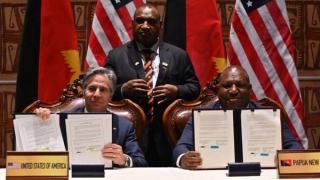Earlier this month, details were made public of a sweeping Defense Cooperation Agreement signed in May by the United States and Papua New Guinea (PNG). USSC Foreign Policy and Defence Research Fellow Blake Herzinger discusses the significance of the agreement and its implications for Australia.
What stands out to you in the US-PNG Defense Cooperation Agreement?
The security relationship made possible by the Defense Cooperation Agreement is far more comprehensive than the previous security agreement and Status of Forces Agreement between the two nations. Port Moresby has opened its doors to US forces to use key facilities around the country to stage and resupply air, naval and ground forces. New security arrangements like this are not everyday events, and this one comes at a time of acute tension in the Indo-Pacific. It’s a striking reminder that while times have changed, geography has not, and states that may not have been prioritised in recent decades will have new opportunities to seek advantageous relationships with superpowers as a result of the increasing competition over access in the region.
Why has the agreement garnered domestic attention and backlash in Papua New Guinea?
Most of the immediate public criticism seems focused on the issue of criminal jurisdiction over visiting US forces, which is an issue the Supreme Court of PNG has addressed in the past with Australian police in the country under a different immunity agreement. More broadly, that argument is one that focuses on retaining sovereignty and independence as competition between Beijing and Washington heats up, which is something the United States is sure to be conscious of in their dealings with Port Moresby. Washington is certainly aware of the fact that this agreement will face some degree of domestic opposition, and the best way to address that opposition is by being good guests that deliver on the promises of enhanced security for PNG’s citizens.
What is the significance of this agreement for Australia, in light of the delaying of Canberra’s own bilateral treaty with Port Moresby over purported wording and sovereignty issues?
While Canberra’s disappointment at the delay of its own treaty with Port Moresby is inevitable, the fact that Washington’s DCA has been signed is of benefit to the alliance. Increasing regional access and basing for US forces creates more flexibility and options for the alliance to incorporate into its own planning. A successful US agreement also should create positive synergy, incentivising Port Moresby to prioritise the PNG-Australia agreement to gain increased capacity building support for its own domestic capabilities.






